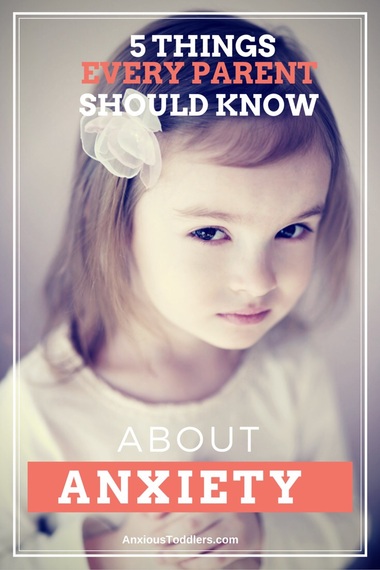Because I eat, live and breathe anxiety - I have made the ridiculous assumption that everyone fully understands child anxiety. Working as a child therapist and having the genetic curse of anxiety in my family's DNA - I get anxiety and unfortunately it gets me.
Over the years I have found some common misunderstandings about anxiety in my practice. If you know anxiety like I do - this list may not surprise you at all. For some of you however - it might shed some new light on anxiety.
1. Anxiety runs in families.
Just like diabetes, hair color and baldness - anxiety runs in families. If anyone in your extended family has a history of anxiety or OCD - your children are at risk of dealing with anxiety too. Anxiety can manifest differently in different family members - and it doesn't have to look the same in each person.
Your Great Aunt Hilda might have been a hoarder, your mother might have had panic attacks and your child get's too nervous to go to school - it is all anxiety.
2. Anxiety does not have to be caused by a trauma or a negative experience.
I am often asked - "Why is he anxious? He has nothing to be anxious about. His life is good." Parents wonder why their children are afraid of bad guys, nervous to go to school or terrified of being separated from their parents. They tell me - "Nothing bad has ever happened to him!"
Anxiety does not have to come from trauma or a bad experience. You can be afraid of dogs without ever being bitten. You can be afraid of bad guys without ever meeting one. You can be sick to your stomach about going to school - without being bullied. If you have anxiety - you can be worried, afraid and nervous about situations that have never happened to you or that pose no real threat.
3. Anxiety can cause many physical symptoms that are not always understood as anxiety.
Anxiety can do some crazy things to our body. The most common symptoms include stomach upset, nausea and vomiting. It can cause frequent headaches. It can cause ongoing constipation or diarrhea. Many of the anxious children I work with have a history of constipation. It can cause panic attacks that make you have shortness of breath, dizziness, chest pain and clamminess.
Some of the rarer symptoms can include difficulty swallowing along with the belief that there is something stuck in your throat. Constant throat clearing can sometimes be a symptom of anxiety. Anxiety can give you the urge to pick at your scabs, bite your nails and pull your hair, eyebrows and eyelashes out.
I always tell people to rule out any possible medical origin before thinking it is anxiety - but it is helpful to know that these physical symptoms can be linked to anxiety.
4. Giving in to your child's anxiety will make their anxiety grow over time.
Some well intentioned parents cater to their children's anxiety. It's hard not to! This is tricky - because there is a fine line between giving in to your child's anxiety versus being aware of when your child has reached their limit. There is a fine line between pushing your child too hard and empowering your child.
Children need to be given tools to learn how to fight their anxiety. They need to be empowered. They need to be supported. At times - they need to be challenged. Having said that - they also need to be understood. They need to not be pushed beyond their limits. The balance can be hard to find!
I have addressed ways to help teach children how to fight their fears in a previous article (click here to read).
5. The earlier a child can get help for anxiety - the better the long-term prognosis.
Often as parents -we take a wait and see approach. Parents might think - this is a stage or maybe they'll outgrow this behavior. The earlier a child can learn coping mechanisms - the better.
You can help by reading books on anxiety with your children or reading parenting books on anxiety. Addressing anxiety head on gives your child the best odds for less anxiety in the future.
Some children benefit from some sessions with a child therapist. Parents can also benefit from learning parental approaches from a child therapist. Just remember - it doesn't have to be extreme for you to start helping your child. Young children who show signs of anxiety are less likely to have developed unhealthy coping mechanisms and are often more open to learning new skills.
If you are not sure your child is anxious - you can read my article 10 Signs of an Anxious Toddler to get an idea of what anxiety looks like in children or consult a mental health professional for an assessment.
Natasha Daniels is the author of How to Parent Your Anxious Toddler. For more of her parenting articles visit AnxiousToddlers.com or follow Natasha Daniels on Pinterest, Facebook, Twitter and Instagram.
